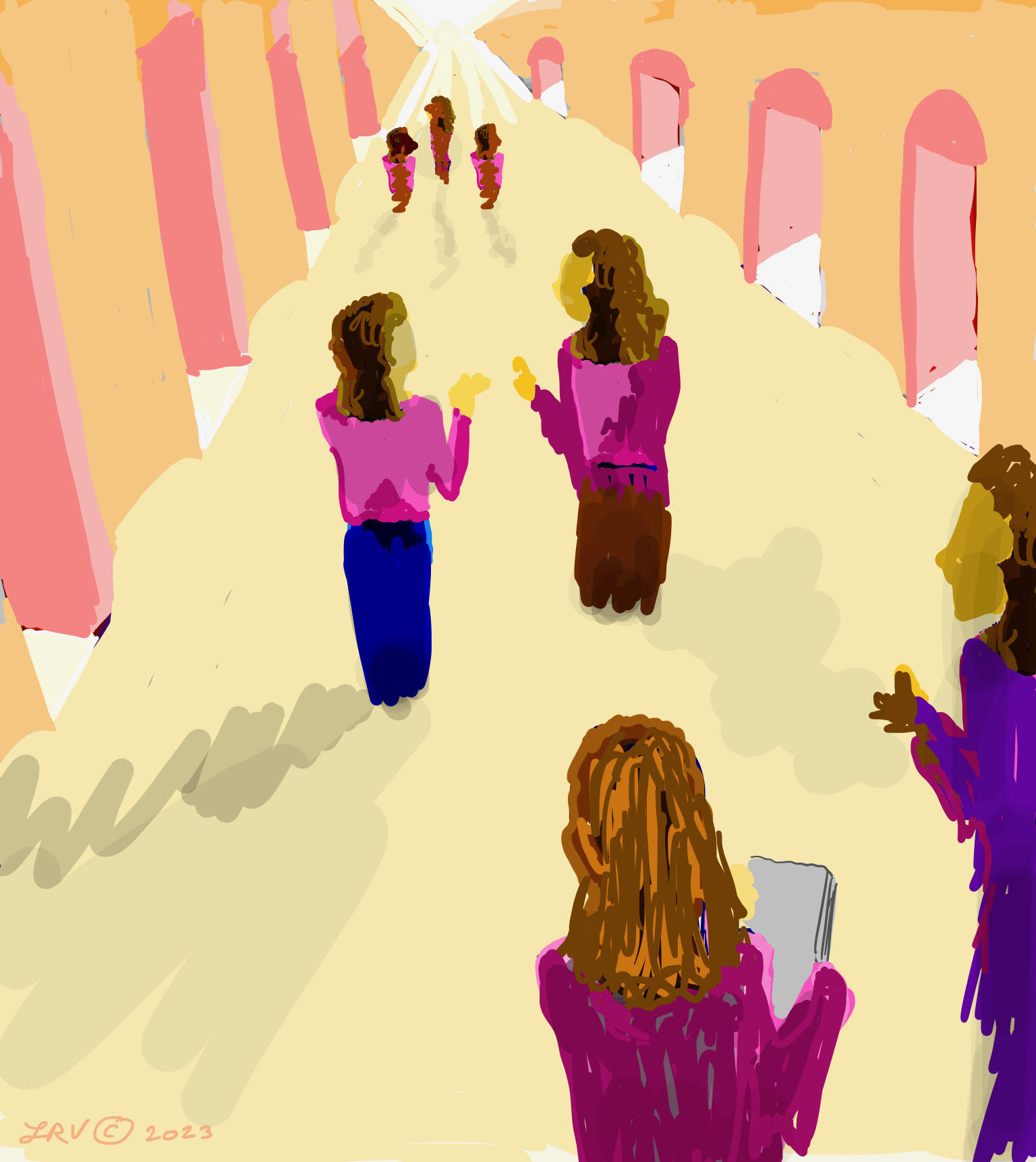Reflection
Normality and pressures
Looking back on these memories, I can see that I had several major doubts in my mind that were difficult to disentangle. What part of this struggle is about me? What part is about my shaky motivation (an impressive credential and putting off figuring out my career) for attempting this incredibly difficult undertaking? What part is about my actual aptitude? What part of my poor treatment was due to my gender?
I also recognize the pressures that were weighing me down. There was the pressure to stay in academia and to validate my professors’ choices/values in thinking that academic research is the best path. There was the additional pressure not to become a statistic by leaving the field as an underrepresented minority (a phenomenon called “the leaky pipeline”).
Personal factors
I remember my personality and how it felt challenging to stand up for myself. I had a tendency to be friendly and to shut down when others were antagonistic towards me, which I now recognize as a fawning response. It felt like I had to manage others’ behavior and emotions to cope with them.
I chose to go into grad school post-marriage, which came with its own challenges. My husband had a terrible time in grad school, too, as a matter of fact, and spent a year unemployed after leaving his own program. We recognized that being a grad student was a very exploitative position in which we were at the mercy of our professors. I still wonder if I could have had a different, perhaps much more positive experience with another advisor.
Resentment and recovery
After I left the program, Vanessa ghosted me. Other students had warned me about her communication issues. I wondered if approval or contact with her had been conditional. She seemed warm while we were working together and I considered her a friend. Was my decision to leave hurtful to her? I imagine much of this was not in her conscious awareness.
I conceptualized it all from a personal perspective at the time, and only much later at an organizational level. It took several years to stop feeling angry about it. I now feel that Tom was a flawed human doing his best. I do look back and feel gratitude for what he did well. I know that nobody’s perfect, including me!
I’ve heard it said that “resentment is like drinking poison hoping that your enemy will die”. But it does feel so unfair that someone can come into our lives, induce years of emotional unpacking through their behavior, and not be affected or even notice the impact they have had. Despite this, I would think that some damage is accumulated in them, some psychic effect of causing harm. They might be damaged themselves and cause harm because of it. I’m reminded of a second saying: “hurt people hurt people”.
Social awareness

I realize now that I was tuned in to social cues in ways that others weren’t. Even the way that professors seemed to walk around the building was odd to me. There was a tendency for them to appear disconnected from their bodies, like they identified only with their brains, and viewed the rest of themselves as a vehicle. They would wander the hallways with their head in front and their body following close behind.
Engineers often seem to think that social thinking is unnecessary or less important. I had one conversation with Vanessa in which she was solely focused on whether I should make one plot or another. I couldn’t muster interest in those questions; I was completely burnt out, and felt a deep need for validation, connection, and support.
I now see my experiences as a pattern in which the people who self-select into demanding, technical jobs are understandably those who are most motivated by solving technical problems. This creates an environment in which, on the whole, those with power are not motivated by, interested in, or necessarily even aware of others' relational needs.
Company culture
Now that I have had two decades of professional experience, I can say a few things about leadership. I think it’s important that the organization resist promoting interpersonally unskilled (and uninterested) but technically strong performers. I think a leader must at least show a willingness and ability to grow their interpersonal skills if they lack them.
The organization can provide a route to developing such skills through practical training. This might cost a few thousand dollars plus their time, but that’s peanuts compared to the cost of employees’ salaries and losing someone because of an incompetent manager. Once a few managers with strong social skills are in place, it will be easier to bring others along. They will set an effective tone for the culture. It’s an investment that pays significant dividends.
In my own company, the HR department can arrange to work through teamwork issues with a group. There is even a dedicated executive coach who works one-on-one with our executive team. I have a good relationship with Alex, our director of engineering operations, who has a clinical psychology degree and reports directly to the CEO. I think my company has a good culture of prioritizing “feelers”, people who care about social aspects of the work. Sometimes the corporate messaging about culture is lip service, sometimes not. But there was no one like Alex in grad school, and if there had been, it would have changed things for me.
Starting an employee resource group
I’m happy to share that I helped create a resource in my company for women in software! It was a winding road to get there, though. I went to a women’s retreat and, while there, met other women from my department for the first time. We had been working near each other, sometimes for years, but had not been able to be resources to each other. My department head agreed that we should start a group, but higher-ups responded by basically saying “we already have a [company-wide] women’s group”. We started it anyway and just didn’t publicize its existence.
My department head left at some point and we got restructured, which brought more women into our department. We opened the group up at that point to anyone who wanted to join and it remains the only discipline-specific employee resource group (ERG) in the whole company.
Some women don’t engage with it, but those who do participate say it’s helpful. I suspect that some who don't engage prefer to not directly face the systemic inequities that exist rather than risk feeling fatigued and demoralized by the struggle. I can understand that perspective. Sometimes I feel very tired. Positive change happens at an excruciatingly slow pace and there is a lot of resistance to it from the corporate establishment.
While our group does pay members for our time, a fact that makes me grateful and proud, the company-wide ERGs do not. Those who organize them and do the on-the-ground work to support underrepresented groups are doing free labor. It makes it seem like the company doesn’t care. They say “we value diversity”…but do you?
With our group, we’re changing the culture, but slowly. It takes conviction to move forward on culture-focused efforts and I’ve found that women-focused groups in an engineering context are especially helpful. I also recognize that White people are overrepresented in my company and department, and that similar support for BIPOC employees would be impactful. It’s a conversation I have been starting but not pushing as much as I could.
Advice for young women in STEM

If I were to go back in time and give my younger self advice, here’s what I would say: See interpersonal and organizational issues as stemming from politics, rather than something personal. This helps to detach from any slights you might experience and keep a healthy mindset.
Something that helped me was joining a women’s support/therapy group that was run through the university’s mental health program. It was facilitated and a safe environment, which made a big difference in allowing me to feel supported. I also had an individual therapist who was terrible. She didn’t address the actual issues and was a bad listener. So don’t be discouraged by people like that; just keep looking.
When considering grad school, I would recommend starting with a teaching assistantship (TA) instead of a research assistantship (RA). I personally couldn’t resist the appearance of prestige, but it’s incredibly important to get to know possible advisors (and talk with their students!) before signing on with them to avoid issues down the road.
If something doesn’t feel right, it might not be right. And it’s totally fine to forgo academia. I would recommend that grad students who have doubts about their career path reach out to people who have left academia. You could ask them what they like about their current role. Get a balanced perspective. If you hear that so-and-so left or dropped out, get in touch with them and see what their reasoning was. This even applies outside of grad school and is an important step towards detecting toxic cultures and connecting with a group that can support you.

